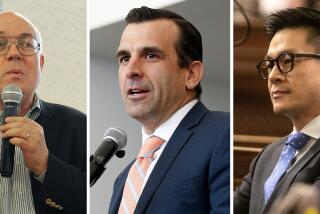Editorial : The Recall Process on Trial : Bernhardt disappointed voters, but her transgressions are not worth ouster
- Share via
The city of San Diego is about to have its first recall election since the Charter was adopted in 1931. On April 9, San Diego City Councilwoman Linda Bernhardt faces the voters who elected her just 17 months ago.
A recall election seems to fit with the times. Direct democracy has been booming with initiatives and referendums in recent years. Combine that with anti-incumbent fever, and you have fertile ground for recall.
Linda Bernhardt, in her first elected office, helped sow seeds of discontent with a series of rather dumb, if not dishonest, mistakes.
She was at least a supporter, if not a prime mover, behind a reapportionment plan that jettisoned Scripps Ranch, which played a major role in her 1989 election.
She made a big deal about not accepting developer contributions during the campaign; yet since the election she has accepted thousands of dollars from the building industry. Her justification is that she only ruled out donations from the principals of companies with business before the city.
This is true, but the campaign pledge became a cornerstone of her candidacy when she burned a Building Industry Assn. questionnaire on the steps of City Hall and sent out a brochure that said Bernhardt “refused to accept any campaign contributions from developers.”
Bernhardt also is under investigation by the city attorney to determine if her outstanding campaign debt violates a city ordinance, and the district attorney’s office is investigating her campaign finances.
Maybe her transgressions will prove sufficient grounds to see her thrown out of office. Maybe they should. They do seem rooted in more than just political inexperience.
But there are other factors worth considering by voters in the old 5th District and in the rest of the city.
* Recall got easier with district elections. Instead of needing a percentage of signatures citywide, recall advocates need only 15% of the voters in the district. In this case that meant only 11,240 voters had to sign a petition.
* These relatively easy recall rules could further discourage qualified candidates from seeking office. Even council members with less political baggage could be pushed from office for taking an unpopular stand.
* Easy recall also could further paralyze government. Recalls, referendums and initiatives--if overused--can generate inoffensive, but also ineffective, laws, or even legislative chaos.
* The city attorney’s investigation of her campaign debt seems questionable because there are other former candidates with outstanding debts who are not under investigation. And neither Bernhardt investigation has resulted in any charges.
* There is merit to Bernhardt’s argument that some of her former district had to shrink; one of the reasons for redistricting is to keep districts roughly equal in population. So some voters were going to be transferred to another district under any circumstances. And, whatever her mistakes, Bernhardt has benefited the city with her voting record on environmental and growth-management issues and the housing trust fund.
This first recall is a time for reflection on broader questions about the process as well as on the specific Bernhardt decision.
What should be the threshold for recall? Are blunders or even relatively minor deception sufficient cause?
Or should it be reserved for officials who have broken the law or who have broken the public trust? Should the recall rules be tightened under district elections?
Are Bernhardt’s missteps and political cowardice sufficient to merit throwing her out of office less than halfway into her term?
We think not. Although Bernhardt’s performance has been a disappointment, local government is better served if recall is saved for more serious cases.
More to Read
Sign up for Essential California
The most important California stories and recommendations in your inbox every morning.
You may occasionally receive promotional content from the Los Angeles Times.













